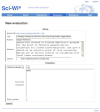
A screen capture showing how to add an article

Sci-Wi is a free web software for the management of scientific peer-reviewing.
Its goal is to manage a web site gathering reviews of research articles, already published online elsewhere. The reviews are made by mandated researchers.
The software is distributed under the GNU General Public License (GPL).
Sci-Wi is currently in alpha stage, meaning that it is not ready. A demo is available, but does not intend to be used by end users. When the software will be stable, it is planned to start a website. In the meantime, you are welcome to contribute, see the sciwi project, on SourceForge.
For news, questions or code, see the Sci-Wi project page.
Sci-Wi aims at implement the last step towards a fully free share of science knowledge. Indeed, free repositories of scientific articles are nowadays successfull projects (see arXiv, for example), but lacks a peer-review system. Sci-Wi thus propose a complementary system to these repositories. Articles themselves are not stored in the database but referenced by their URL, so that it is possible to review almost any article, even already published ones.
An interesting edge effect is that projects without integrated experts evaluation, like Wikipedia, could benefit from an extern system. Moreover, Sci-Wi is developed by and for scientist, but could be used by anyone needing a peer-reviewing system.
Typically, a researcher can start a new "journal" (thus becoming an editor) in the form of a selection, which is a tag associated to a set of articles versions. As an editor, he can ask to some researchers to review an article. These reviews are noted as "mandated reviews" and pointed up. If the reviews are positives, the editor can decide to "publish" them, by adding its journal's tag to the article version.
Anonymous and unmandated reviews are permitted along with comments of existing ones, but mandated reviews are always pointed up. A review consist of a set of evaluations (for example: insight, reliability, style, as in the PLoS ONE journal categories), comprising a mark associated with a comment. A reviewer can add several evaluations to a single article version, and decide wether its name should appear beside the review or not. Every reviewers, articles and selections have a set of tags associated with them, thus permitting to search content by keywords.
For more visual explanations, check the general diagram and a comparison of processes: SciWi versus classical academic publishing.
The software is currently implemented by Johann "nojhan" Dréo, research scientist in computer science and former member of the board of Wikimédia France. If you want to contribute (and this would be greatly appreciated), please subscribe to the general mailing-list and send a message.
We need advices on how to manage a good reviewing process, HTML designers and, of course, code writers and alpha-testers. If you just want to stay informed about the progress of the project without reading general email discussions, you can subscribe to the project's news feed.
Sci-Wi relies on the PHP Zend framework and on MySQL.
If you want the general idea behind the code architecture, you can take a look at the database structure scheme. As Sci-Wi use the Zend Framework, it is structured as a Model-View-Controller application. You can browse the source tree online.
